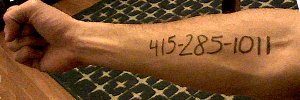What to expect when arrested
This is a quick overview of the various steps you go through when you are arrested, to give you an idea of what to expect.
Detention
- This is when police are not allowing you to leave a location, but you aren't technically arrested
- You can find out if you are being detained by asking 'Am I free to go?' or "Am I being detained?"
- Cops are allowed to hold you until they feel that you're not involved in whatever they're investigating (or until they arrest you)
- You don't have to answer any of the police's questions. Just say I am going to remain silent. I want to see a lawyer
- It may speed things up if you give them your ID, name, and address
- If they want to search you (your bag, car, bike, house, tent, whatever) say loudly and clearly I do not consent to a search
Arrest
- Arrest is when the cops are charging you with a crime and taking you into custody
- Cops can search you and your bags
- You may be released with a citation, or you may be taken to a police station
Booking
- Booking is when the police process you into the jail system
- You'll likely be fingerprinted and have your photo taken
- Police will ask you for your name and address. Giving this information will get you released sooner
- Do not answer any other questions. Just say I am going to remain silent. I want to see a lawyer
- Having a photo ID will make this process go faster
- You may have to wait a long time to be booked
Jail
- It may take a long time after being booked to be released
- Jail can be very boring
- Guards control your access to water, food, phones, etc.
- You'll most likely be sharing cells with other protesters, or folks picked up for minor crimes (petty theft, DUI, prostitution) - not murderers
- You have a right to get your medicine in jail. If guards refuse to give you medicine you need, call the legal hotline
Release
There are 4 ways to be released from an arrest:
Citation
- A promise to appear in court or pay a fine (like a traffic ticket)
- Citations say 'signing this is not an admission of guilt'
- You may be cited and released at the scene, before booking, or after booking
- Keep your citation
- If you don't make your court date or pay your fine, a warrant may be issued for your arrest
- You'll most likely be cited and released, unless you are charged with a felony or violent crime, or have warrants
Own Recognizance
- Often abbreviated as 'O.R.'
- This comes up after you're initally not offered a citation (i.e. you have a felony or violent misdemeanor)
- The O.R. Project, a local non-profit, will get you released if you 1) are not a threat to the public and 2) are likely to appear for your court date
- It helps to have folks lined up who can vouch that you have strong ties to the community (friends, family, boss)
- What you tell the O.R. project can't be used against you
Bail
- For more serious charges, or if the court decides you're a flight risk, you may have to pay bail
- Bail is like a deposit you pay to the court that you get back when you show up to your court date
- If you're not local, have few community ties, have a more serious charge, or a history of not appearing for court dates, you'll get a higher bail
- Bail must be paid in cash
- You can also pay 10% of the bail amount to a bail bondsman - they front the rest, but you don't get your 10% back
- If you don't show up to your court date, you lose your bail money forever
- Even if you do show up, it may take a long time to get your money back
- Bail is set automatically when you are booked, based on the charges
- May be reduced by a judge later
Arraignment
- Needs to happen within 72 business hours of booking (weekends don't count)
- See below.
Arraignment
- Your arraignment is your first court appearance
- It's usually three hearings rolled into one
- Formal Charges
- This is when the District Attorney formally gives you your charges
- The DA's charges may be totally different - and are often much less serious - than what the cops arrested you for
- You may show up to court and find out your charges are dropped
- This is also where you enter a plea to the charges against you
- If you must enter a plea, 'not-guilty' keeps the most options open for you
- Appointment of Counsel
- The National Lawyers Guild will provide a free lawyer for the arraignment of everyone arrested on March 15th and 19th
- You can also go with a public defender, represent yourself, or hire your own attorney
- Bail
- This is when the judge will reassess what your bail is, based on your official charges from the DA and specifics of the case
- Judge also may decide to release you on O.R.


